
Crockett
 Highway 21 runs in a diagonal line from San Marcos (just north of San
Antonio) to Nacogdoches,
then east into Louisiana.
Highway 21 runs in a diagonal line from San Marcos (just north of San
Antonio) to Nacogdoches,
then east into Louisiana.
Find these two cities on a map and trace a path between the two.
There is a legend which says an Indian chief had twin sons. What is a legend? One son was fair-skinned with light hair, the other dark-skinned with dark hair. When they became adults, the chief didn't want them to fight for control of the tribe. To avoid conflict, he ordered them to move their own families and friends in opposite directions. One went east into what is now Louisiana and the other moved west, farther into what is now Texas. Because the two brothers remained on good terms, their communities visited and traded with each other.
The connecting trail was well established by the time the Spanish came. They extended it to connect the northern Spanish missions like San Francisco de los Tejas(1690--later moved and known as San Francisco de la Espada) with the Spanish settlements on the Rio Grande. During the time of Spanish control the road was known as El Camino Real or The King's Highway. By the 1800's it was what we today would consider a "freeway". Cotton, lumber, supplies, mail, pioneers, and soldiers moved or were transported along this road. The extended route between and beyond the two Indian settlements eventually became what is now Highway 21.

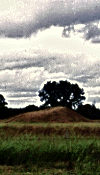 Here you see the remains of two Caddo ceremonial mounds. The Caddo
Indians were members of the Hasinai (means "our own folk") Confederacy
which was a group of thirteen Indian tribes living between the Neches
and Trinity rivers. Locate those two rivers on a map.
Here you see the remains of two Caddo ceremonial mounds. The Caddo
Indians were members of the Hasinai (means "our own folk") Confederacy
which was a group of thirteen Indian tribes living between the Neches
and Trinity rivers. Locate those two rivers on a map.
The Hasinai were first known as "Tejas" meaning "friends" or "allies" from which we have the name of our state.
Archeologists have found evidence dating from 500-1100 AD to show both mounds supported temples and the larger mound also revealed several burial sites. How long ago was that? All around these mounds on the flat land below, there would have been houses of the village. Pipes, charred corn cobs, nuts, flint points and pot fragments have been found in the area. From descriptions left by Father Damian Massanet, we know their homes resembled giant beehives.
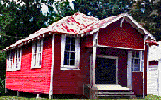 This
school in the Allen
Chapel community east of Crockett is a symbol of Black America's pride
in education. Churches and schools were the center of pioneer life. In
the very early days the church-school might also have served the pioneers
as a fort. The situation was much different for slaves. While religion
played an important role in their lives, they were not allowed to attend
any existing schools or to have schools of their own until after passage
of the 13th
Amendment. Even then, their schools remained separate and less than
equal until the middle of this century.
This
school in the Allen
Chapel community east of Crockett is a symbol of Black America's pride
in education. Churches and schools were the center of pioneer life. In
the very early days the church-school might also have served the pioneers
as a fort. The situation was much different for slaves. While religion
played an important role in their lives, they were not allowed to attend
any existing schools or to have schools of their own until after passage
of the 13th
Amendment. Even then, their schools remained separate and less than
equal until the middle of this century.
What is an amendment? What does this one amend?
This school is significant because it resulted from the work of a man named Julius Rosenwald. He was a philanthropist from Chicago. What is a "philathropist"? Realizing the importance of education, he began awarding grants in 1913 to fund school buildings for Negroes. This building was one of 518 Rosenwald schools constructed in Texas with funds from such a grant. It operated until 1955.
Playground equipment consisted of a baseball diamond, a basketball goal, and a swing in the mulberry tree. What equipment do you have to use at recess or in PE?
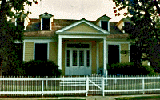 This home in Crockett was owned by the grandnephew of President
James Monroe. When was James Monroe president? There was
no hotel in the area, so the owners would loan the upstairs rooms (where
you see the dormer windows) to couples who came into town to get married.
This home in Crockett was owned by the grandnephew of President
James Monroe. When was James Monroe president? There was
no hotel in the area, so the owners would loan the upstairs rooms (where
you see the dormer windows) to couples who came into town to get married.
Wedding ceremonies were quite dull by today's standards. The ceremony was simple and usually private. The best clothes and partying were saved for the "First Day" celebration which occurred the day after the wedding. Often the owners of this home would open the entire downstairs for such celebrations.
The design of the home is an u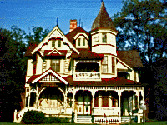 pscale "dog-trot"
with a wide porch extending the entire length of the house across the
back.
pscale "dog-trot"
with a wide porch extending the entire length of the house across the
back.
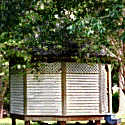 This home was completed in 1893 using materials brought in from other
states. There were no "Builder's Square" or "Home Depot" stores in
1893. It has a well house designed to protect the outside water source.
Have you ever tried to fill a bathtub by carrying water to the tub
one pan at a time? It was the first home in town to have running
water.
This home was completed in 1893 using materials brought in from other
states. There were no "Builder's Square" or "Home Depot" stores in
1893. It has a well house designed to protect the outside water source.
Have you ever tried to fill a bathtub by carrying water to the tub
one pan at a time? It was the first home in town to have running
water.
What did a bathroom look like in 1900?
The city of Crockett is named for Davy Crockett, the Tennessee scout who camped in the area on his way to the Alamo in 1836. It is said some people in the area thought he was a horse thief and nearly had him arrested.
Would
history have changed if he hadn't made it to the Alamo?
What happened to horse
thieves in the 1800's ?
Books to Read and Other Resources
- INDIAN TRIBES OF TEXAS by Day, Jones, Kelley et al; Texian Press, 1991
- BROWN PAPER SCHOOL USKIDS HISTORY BOOK OF THE AMERICAN INDIANS by M. Smith-Baranzini and H. Egger-Bovet; Little, Brown & Co., 1994
- CYNTHIA ANN PARKER by Catherine Troxell Gonzalez; Eakin Press, 1980
- ROSA PARKS: MY STORY by Rosa Parks with Jim Haskins; Scholastic, 1994
- DAYDREAMERS by Tom Feelings and Eloise Greenfield; Dial Books for Young Readers, 1985
- NIGHTJOHN by Gary Paulsen; Bantam Doubleday Dell, 1993
- THE PEOPLE WHO COULD FLY, AMERICAN BLACK FOLKTALES told by Virginia Hamilton; Scholastic, 1994
- MISSISSIPPI BRIDGE by Mildred D. Taylor; Bantam Skylark, 1990
- THE FRIENDSHIP; THE GOLD CADILLAC by Mildred D. Taylor; Bantam Skylark, 1987
- AMOS FORTUNE FREE MAN by Elizabeth Yates; Puffin Books, 1989
- COLIN POWELL by Jonathan Everston; Bantam Skylark, 1991
- THE BIOGRAPHICAL DICTIONARY OF BLACK AMERICANS by Rachel Kranz; Facts on File, 1992
- MUDDY BANKS by Ruby C. Tolliver; Texas Christian University Press, 1987
- GRANDPA'S FACE by Eloise Greenfield; Philomel Books, 1988
- PHILIP HALL LIKES ME. I RECKON MAYBE. by Bette Greene; Dial Books, 1974
- TALK, TALK AN ASHANTI LEGEND retold by Deborah M. Newton Chocolate; Troll Associates, 1993
- OPPOSSUM AND THE GREAT FIREMAKER, A MEXICAN LEGEND written and adapted by Jan M. Mike; Troll Associates, 1993
- THE LLAMA'S SECRET, A PERUVIAN LEGEND written and adapted by Argentina Palacios; Troll Associates, 1993
- THE SEA SERPENT'S DAUGHTER, A BRAZILIAN LEGEND written and adapted by Margaret H. Lippert; Troll Associates, 1993
Web resources:
Dramatizing Legends, Folktales, and Myths
Lincoln's Emancipation Proclamation
Suggested Activities
1. On a map of Texas, locate both the county and the forest that are also named for Davy Crockett.2. Pretend it is one hundred years from now and the state of Texas wishes to place an historical marker on your house. Use a program like PrintShop to design your marker. Consider carefully what you want included as information before you word process it into your design. A sample is included here.
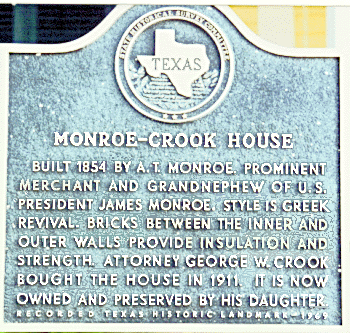
For more information, write to:
629 N. 4th Street
Crockett, TX 75835-4035
Crockett Area Chamber of Commerce
